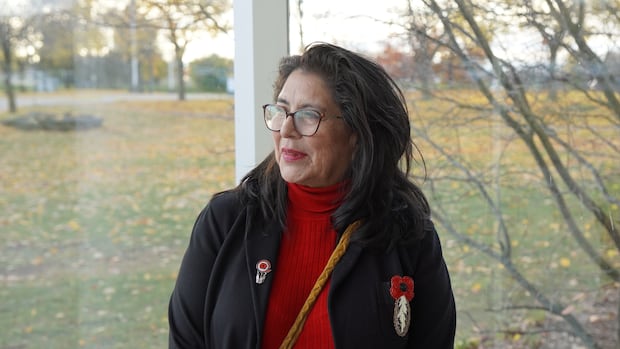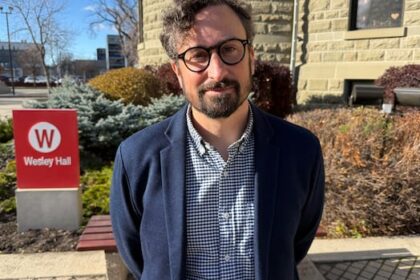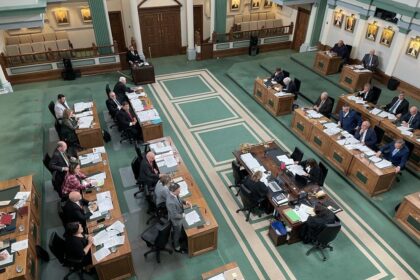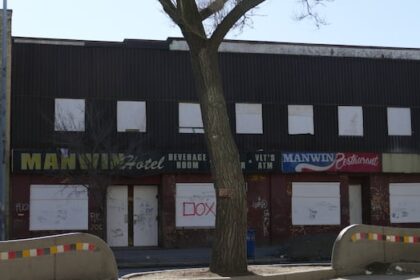OttawaSaturday’s gathering on Indigenous Veterans Remembrance day allowed people to reflect on the sacrifices of Indigenous veterans and highlight how many have been treated differently than their non-Indigenous peers. Indigenous Veterans Remembrance Day has been marked since 1994Cameron Mahler · CBC News · Posted: Nov 08, 2025 7:38 PM EST | Last Updated: 3 hours agoListen to this articleEstimated 3 minutesThe audio version of this article is generated by text-to-speech, a technology based on artificial intelligence.Elder Verna McGregor says there’s a long history of Indigenous contributions to the Canadian Armed Forces, and that by recognizing them with their own Remembrance Day is a step toward reconciliation. (Cameron Mahler/CBC)People gathered at the Canada Aviation and Space Museum on Saturday to mark Indigenous Veterans Remembrance Day.The ceremony honoured First Nations, Inuit and Metis soldiers who served in Canada’s military, and reflected on the inequities many faced after returning home.Observed every Nov. 8, the day began in Manitoba in 1994 and has since become recognized across the country. For many, it’s also part of an effort to show how Indigenous veterans were treated differently from their non-Indigenous peers.Elder Verna McGregor said it’s a history that must be remembered.“It’s very important because it’s part of our history,” she told CBC. “And that’s reconciliation.”’There was no equality’McGregor is from Kitigan Zibi Anishinābeg in western Quebec, where she says there’s a long history of service in the Canadian Armed forces.She said it’s their sacrifices — and those of many other Indigenous members — that has helped build a good relationship between Indigenous peoples and the military.But it could always be better, she added.“If you know the history of the [Indigenous] veterans who returned from the various conflicts, especially the First and Second World Wars, they weren’t treated the same as the non-native veterans,” McGregor said.By commemorating the lives of Indigenous members, the public continues down the path of reconciliation, she said.“When they say, ‘Oh, why do they need a separate day for the Indigenous veterans,’ it’s because for Indigenous veterans, there was no equality.”For Col. David Grebstad, Indigenous Veterans Remembrance Day isn’t about replacing Remembrance Day but rather about recognizing the differences in how Indigenous veterans were treated. (Cameron Mahler/CBC)Col. David Grebstad, deputy commander of the Armed Forces Transition Group and a Red River Metis citizen, said people often tell him there should only be one Remembrance Day.“That would be true if every veteran was treated the same, but we know Indigenous veterans … did not get treated the same,” he said.The day is not meant to replace Remembrance Day, he said, but to acknowledge that key difference.Grebstad said the Canadian Armed Forces has made strides toward inclusion, allowing Indigenous service members to wear braids, sashes and beadwork in uniform.“Those changes have all been made to make Indigenous service members feel both welcome … but also to express their Indigenous heritage and culture.”For McGregor, remembrance ultimately carries a universal message.“Remembrance Day is almost like a recognition day of why we need peace.”ABOUT THE AUTHORCameron is a journalist with CBC News. He’s worked with CBC Kitchener-Waterloo covering local news, municipal councils, and both the 2025 provincial and federal elections. Cameron also interned with CBC Toronto’s Enterprise Unit, helping to cover elements of the Greenbelt controversy. Contact Cameron with story ideas at cameron.mahler@cbc.ca. Follow Cameron on X @cam_mahler
Thursday, 5 Mar 2026
Canada – The Illusion
Search
Have an existing account?
Sign In
© 2022 Foxiz News Network. Ruby Design Company. All Rights Reserved.
You May also Like
- More News:
- history
- Standing Bear Network
- John Gonzalez
- ᐊᔭᐦᑊ ayahp — It happened
- Creation
- Beneath the Water
- Olympic gold medal
- Jim Thorpe
- type O blood
- the bringer of life
- Raven
- Wás’agi
- NoiseCat
- 'Sugarcane'
- The rivers still sing
- ᑲᓂᐸᐏᐟ ᒪᐢᑿ
- ᐅᑳᐤ okâw — We remember
- ᐊᓂᓈᐯᐃᐧᐣ aninâpêwin — Truth
- This is what it means to be human.
- Nokoma











